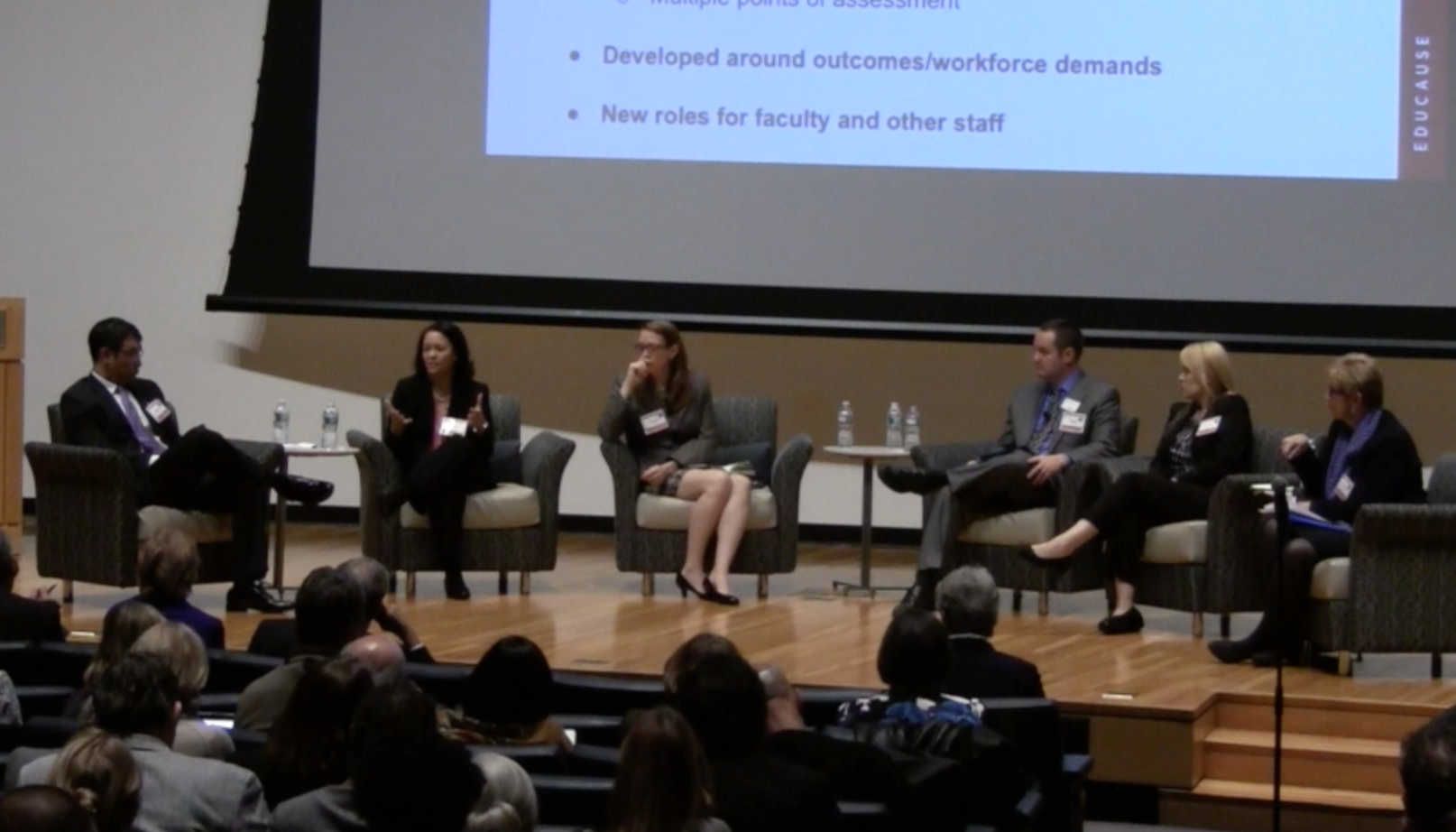
- This event has passed.
The Case for Competency-Based Education: A New Age of Teaching and Learning?

Oct. 20, 2014
Federal Reserve Bank of Boston
Why today’s interest in competency-based education (CBE)? “Number one, the degree completion agenda period is driving this—the fact that so many states are moving to performance funding, and colleges are feeling drive to help students be successful,” says Pamela Tate of the Council for Adult and Experiential Learning (CAEL). In addition, “A lot of employers are really pushing for having a clearer idea of what people know and can do in the workplace.”
Introducing NEBHE’s CBE Conference
NEBHE President and CEO Michael K. Thomas introduces NEBHE’s October 20 conference on CBE.
Understanding Competency
The opening panel of the NEBHE CBE conference featured Pamela Tate along with Nick Lee of the Bill & Melinda Gates Foundation; Holly Morris of Educause; Alison Kadlec of Public Agenda; moderator Paul Fain of Inside Higher Ed; and Amy Laitinen of the New America Foundation.
The Future of CBE
Amy Laitinen
speaks about future of CBE (with Paul Fain and Pamela Tate.).
What the Research Shows about CBE
During a session on “What the Research Shows about CBE”, Robert Lytle, partner and co-head of the education practice at the Parthenon Group, offered a taxonomy of the CBE student market. In addition to “career accelerators” and “industry switchers,” Lytle noted, a market of “low-cost online folks” who gravitate toward the “faster, cheaper” aspect.
Excelsior College President John Ebersole and Northeastern University VP and Dean John LaBrie gave responses. Educate Online CEO Carol Vallone facilitated.
Against the Grain: Perspectives of Accreditors and Authorizers on Institutions’ Pursuit of CBE
A session on “Against the Grain: Perspectives of Accreditors and Authorizers on Institutions’ Pursuit of CBE” featured: David Soo, senior policy advisor in the U.S. Department of Education; Barbara E. Brittingham, president of the Commission on Institutions of Higher Education at the New England Association of Schools and Colleges; and Michael Milligan, executive director of the Accreditation Board of Engineering and Technology (ABET). David Bergeron, vice president for postsecondary education at the Center for American Progress, facilitated.
Beyond Competency: What CBE Means for Critical Skills, Liberal Education and the Future of Authentic Assessment
A session on “Beyond Competency: What CBE Means for Critical Skills, Liberal Education and the Future of Authentic Assessment” featured: facilitator Alison Kadlec, vice president at Public Agenda; Carol Geary Schneider, president of the Association of American Colleges and Universities; Linda Schott, president of the University of Maine at Presque Isle; and Christopher E. Hopey, president of Merrimack College.
Building a CBE Approach on Campus: Faculty Empowerment and Buy-In
A session on “Building a CBE Approach on Campus: Faculty Empowerment and Buy-In” featured: facilitator Philip DiSalvio, dean of the College of Advancing and Professional Studies at the University of Massachusetts Boston; Raymond J. Rice, provost and vice president for academic affairs at the University of Maine at Presque Isle; professor James Kennedy, chair of the Academic Committee, Faculty Advisory Council at the University of Maryland University College; and Iris Palmer, senior policy analyst at the National Governors Association.
An Expert Witness Puts It All Together
A keynote session featured Southern New Hampshire University President Paul LeBlanc, introduced by New England College of Business President Howard E. Horton.
LeBlanc’s key message: “The credit hour is really good at telling us how long someone sat, not particularly great at telling us what they learned.”
“Five years ago, even on our traditional campus, we rarely heard people ask about that do your graduates do afterwards. They sort of gave us the benefit of the doubt, but not post 2009, not with all the articles people are seeing about graduates being malemployed or underemployed,” added LeBlanc.
Assessing Direct Assessment
A “Master Class” offered participants the opportunity to learn in depth about specific models and institutions that offer CBE. One such session featured: Kate Kazin, chief academic officer at the College for America at Southern New Hampshire University; Scott Kinney, president of Capella University; and Sally M. Johnstone, vice president for academic advancement at Western Governors University.
Online or Offline? Or Both?
Another “Master Class” session featured James E. Selbe, assistant director for distance education at the Kentucky Community and Technical College System, and Charla Long, dean of the College of Professional Studies at Lipscomb University.
Interview with Paul Fain of Inside Higher Education
Paul Fain speaks with NEJHE‘s John O. Harney.
Click on each speaker’s name below to view and download PDF versions of their PowerPoint presentation featured at the summit:
- Sally M. Johnstone, Vice President for Academic Advancement, Western Governors University
- Kate Kazin, Chief Academic Officer, College for America at Southern New Hampshire University
- Scott Kinney, President, Capella University
- Paul LeBlanc, President, Southern New Hampshire University
- Robert Lytle, Partner and Co-Head of Education Practice, The Parthenon Group
- Holly Morris, Director of Postsecondary Model Development and Adoption, Educause
Click below to download various other materials from the conference:
The list of speaker biographies
Information about NEBHE’s programs and services
Watch the short video featured in Scott Kinney’s presentation here.
We once again would like to thank our sponsors for their generous support:

Details
- Date: October 20, 2014
-
Time:
8:30 am - 4:00 pm
- Event Categories: Events, Homeslide, The Journal
- Event Tags:Events
Venue
- Federal Reserve Bank of Boston
